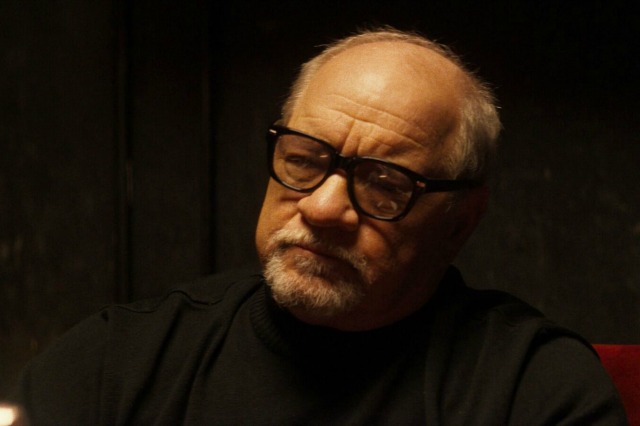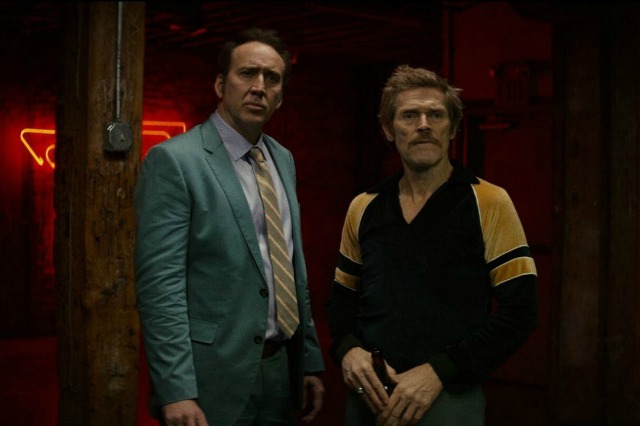Paul Schrader Talks 'Dog Eat Dog' Filmmaking & Why Movie History Is Now Beyond Us All
By Joel Wicklund in Arts & Entertainment on Nov 4, 2016 4:10PM

Paul Schrader in his cameo role in "Dog Eat Dog." (Photo courtesy of RLJ Entertainment.)
It has been anything but smooth sailing for Paul Schrader in recent years.
He has seen his work abandoned and completely reshot by another director (his Exorcist prequel, Dominion, giving way to Renny Harlin's Exorcist: The Beginning), made headlines struggling through the combustible casting of Lindsay Lohan and porn star James Deen in The Canyons, and disowned his last film, Dying of the Light, after being denied final cut.
And while films like The Walker and Adam Resurrected have had less tumultuous behind-the-scenes tales, they have also had trouble finding an audience. It all might be enough to discourage any filmmaker, let alone an artist who has Taxi Driver, Raging Bull, Blue Collar, American Gigolo and The Last Temptation of Christ on his resume as screenwriter and/or director.
But Schrader has plenty of fight left in him. Angered over the fate of Dying of the Light, he and that film's star, Nicolas Cage, were determined to reunite for another project—this time with Schrader guaranteed final cut. The trade-off for that control was a low budget and a script (by Matthew Wilder) in a commercially safe genre. The result is the ultra-violent, wildly stylish Dog Eat Dog.
"I wanted to do a film with Nic Cage again. I wanted to have final cut and we wanted to work together to make up for the way we'd been treated," Schrader told Chicagoist. "And it just so happened it turned out to be a crime film. So I have this situation where I'm making a crime film. I'm not a 'crime film' director, but I do have final cut. I don't have a lot of money, but I can do anything I want. And the challenge becomes: what would a crime film look like in 2016? So, studying crime film and thinking about it post-Scorsese, post-Tarantino, post-Guy Ritchie...this was the answer I came up with."
Love it or hate it, Dog Eat Dog pretty much defines uninhibited. Based on a novel by Edward Bunker, a criminal-turned-author who acted in Quentin Tarantino's Reservoir Dogs, it is as frenetic and aggressive as anything Schrader has made to date.
"I just felt that this genre is so tired. And this story—three cons on their last big score—is such an old trope, that you have to be bold," he said. "Otherwise, why do it?"
Despite Cage's penchant for bigger-than-life performances, the film's most unstable and savage character, Mad Dog, is played by Willem Dafoe. Cage took on the less showy role of Troy, leader of the movie's dysfunctional criminal trio.
"When I sent the script to Nic, I offered him [the role of] Mad Dog. And he said, 'I just played a whack job, I'd rather not play another one so quickly, so why don't I play Troy?' " Schrader said. "And so then we could offer really the best role to Willem."
It's Schrader's seventh time working with Dafoe, going back to the actor's performance as Jesus in the Scorsese-directed, Schrader-scripted The Last Temptation of Christ (1988). Asked what he likes about the actor, Schrader said that he brings the unexpected to the set.
"He's an intellectual, a very serious guy. His background is in experimental theater, so when you ask Willem to do something, you do it because you want to see what he'll come up with. With other actors, you say, 'I want you to do exactly what you do.' With Willem, you say, 'What do you think? How would you do this?' And he always surprises you."

Nicolas Cage and Willem Dafoe in "Dog Eat Dog." (Photo courtesy of RLJ Entertainment.)
Schrader obviously also has a good working relationship with Cage, as evidenced by the actor's eagerness to jump in on another movie with the director after the frustrations of their last effort. While Cage has become notorious for nearly trashing his headliner status with an almost non-stop run of dubious low- to mid-budget features, his name still holds a lot of value in getting a project off the ground.
"The nice thing about working with Nic Cage is that you get your film made," Schrader said. "The drawback is that he eats your budget up."
Despite his contribution to some landmark movies, Schrader is very much in the same position as many independent filmmakers—working harder than ever to get his movies made and then hoping they get noticed in an ever-expanding world of viewing options. While the basics of getting a film made and released are easier than ever, thanks to affordable technology and self-distribution platforms, maintaining a career in the movie business is as daunting as it's ever been.
"The good news is you can make a film for $10,000 in three days," Schrader noted. "The bad news is you can lose that $10,000 in three days. There is no guarantee that being a filmmaker is a viable income-earner anymore. In the past, if you were a filmmaker, you could make money even if the films didn't. Today being a filmmaker is like being a musician. You've got about a four or five percent chance of making a buck."
Though it will get a marginal theatrical release, like most movies outside of the blockbuster realm, Dog Eat Dog will mainly reach viewers through video-on-demand (VOD). Schrader is blunt about what it takes to compete in that overcrowded digital marketplace.
"I mean, that's why we're having this conversation. The goal, the distributor told me, of everything they're doing—we've been to seven film festivals, we've had three retrospectives [of Schrader's past work], three or four premieres, all these interviews—the goal of all of this is to be number one VOD on the opening weekend. Even the theatrical release. How do you get noticed with all the other product that's going to be available the same time you are? You have to start working the festivals because you don't have $50 million to pour into advertising."
That flood of movie product is also changing the historical record of the art form. When we talked to Schrader, it was shortly after Peter Bogdanovich received a career achievement honor at the Chicago International Film Festival. Like Bogdanovich and Scorsese, Schrader is a true film scholar. His Transcendental Style in Film: Ozu, Bresson, Dreyer is considered one of the essential modern film studies and he has continued to explore the aesthetics and lineage of cinema in the pages of Film Comment and elsewhere.
Asked if he thought any younger filmmakers had the kind of grasp on film history that his generation of moviemakers had, Schrader again raised the sheer volume of work being produced—especially as television and films co-exist now as interchangeable at-home "content."
“It is no longer quite credible to [say you] really grasp film history. It's almost impossible to grasp the current history. You know, there's 400 scripted TV series now, there's 30 films coming out a week and that's in the U.S. alone. Then you have the international markets. And you have the entire history of film that's available online. So how does anyone keep up? You don't. You simply don't. So certain directors will feed off certain influences, but you cannot expect anyone to have that kind of encyclopedic knowledge that Bogdanovich had or [legendary film critic] Pauline Kael had. I remember Pauline Kael telling me that she remembered every decade of film history...it was all present for her. Well, it's not present for anybody anymore."
Despite the odds the current content avalanche has stacked against him and his extended run of tough luck, Schrader is not waving the white flag. With his new film just opening, he is already scheduled to climb back into the director's chair soon, helming a religious-themed thriller, First Reformed, with Ethan Hawke and Amanda Seyfried—still carving out his place in the dog-eat-dog movie business.
Dog Eat Dog opens theatrically on Nov. 4 in Los Angeles and New York City and Nov. 11 at AMC's Loews Woodridge 18 in the Chicago area. It premieres on various VOD platforms on Friday, Nov. 11.